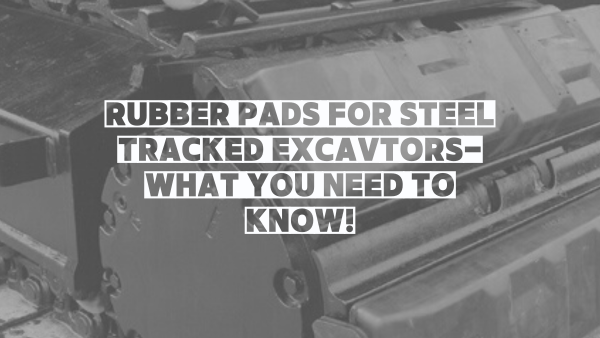Rubber Pads For A Steel Tracked Excavator – Uncovered
If you are considering using a tracked excavator for a of construction, demolition, or landscaping project, one question you may ask yourself is, “do I need rubber pads for a steel tracked excavator?”
Before hiring or purchasing an excavator, determining the type of tracks that you use can be an integral decision to your overall project. During this article, we will take you through the advantages of rubber pads for steel tracked excavators. We’ll discuss their benefits, as well as where and when they are best used.
What are rubber pads used for on an excavator?
Rubber pads are designed specifically to attach to the existing mounted steel tracks of an excavator. Whilst most compact tracked equipment is usually mounted on rubber tracks, larger excavators will generally sit on steel tracks. Rubber pads are used to produce fewer vibrations and noise while operating the machinery. But why should this matter? Producing fewer vibrations and noise can allow machines to reduce their overall effect on the area you are working on.
Benefits of rubber pads for a steel tracked excavator?
Choosing rubber pads for a steel tracked excavator has many benefits including:
Fewer vibrations
The reduction of vibrations allows for far more comfortable operating.
Minimal work area damage
High-quality trackpads can protect your working surface and avoid any costly clean-ups. This is highly beneficial when operating large excavators on roadsides.
Operating noise reduction
Noise reduction protects operators and others from potentially causing harm.
Rubber Track Pads Vs Steel?

There has forever been a long debate on which type of track is best. However, it is fair to say that there is far more to them than just their material properties.
Steel trackpads are popular with the use of larger excavators for their toughness and durability. In addition to this, the steel tracks offer an extra counterweight and lower centre of gravity for the machine. Because of this, they are an ideal choice for working in harsh wet conditions.
Their alternative, the rubber trackpads, provide a way to reduce the overall surface damage caused by the excavator.. Whilst steel tracks are mostly available on larger excavators, the addition of interchangeable rubber pads gives operators the option to use larger machines on delicate surfaces.
Types of rubber pads for a steel tracked excavator. (Large excavators)
There are a few different designs of replaceable rubber pads which are as follows:
Bolt-on pads
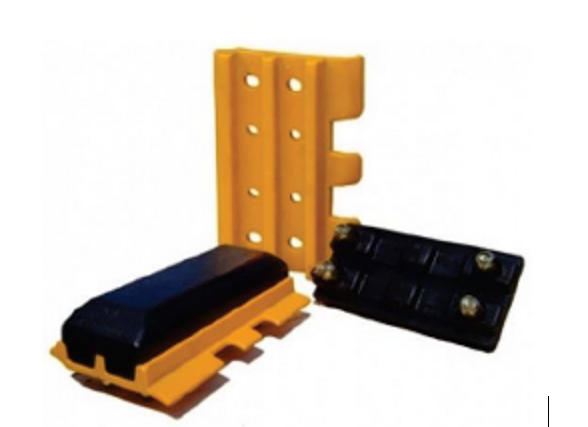
These types of excavator rubber pads are ideal if there are pre-drilled holes in the grouser shoes. Their pads are bonded with the pre-formed metal plates which can be installed in between the steel grousers. These types of excavator pads are extremely durable and cost-effective.
Side mount/ Clip-on pads
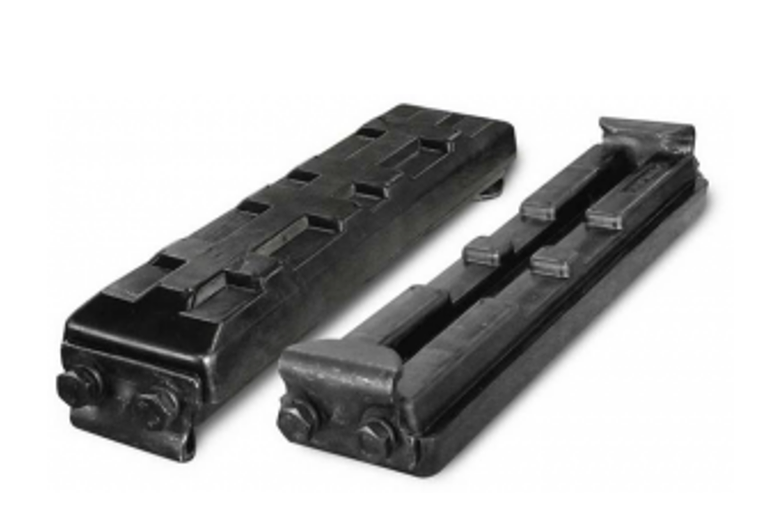
Side mount or clip-on pads can be used where pre-drilled holes do not exist. Similar to the bolt-on pads, this style of rubber pad includes a steel plate. In turn, making them more durable but increasing the overall weight of the machine drastically. Clip-on pads offer a more efficient way of installation and replacement.
Chain-on rubber pads
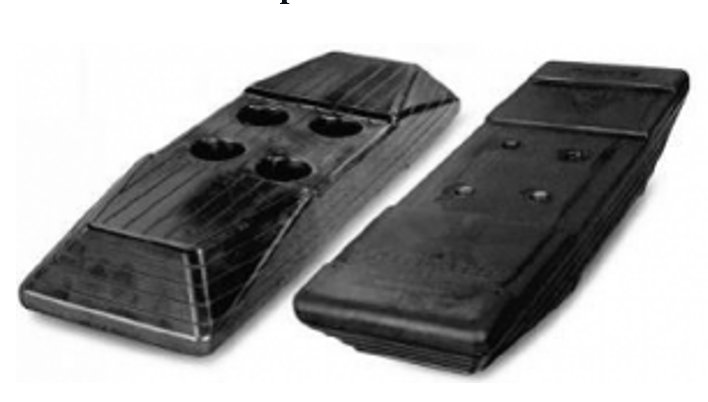
Chain-on pads are the least harmful pads to your site and highways. Unlike clip-on or bolt-on, there are no exposed steel surfaces on the track. This ensures that any mistakes made on-site, like running alongside curbing or other fragile materials, leaves no expensive damage.
What is an excavator grouser?
An excavator’s grouser is the tread part of a steel track shoe. This is the part that comes into direct contact with the ground. The distance between the outer to the inner side of the grouser is called the grouser depth.

Things to look out for when hiring a rubber pad excavator?
If you have concluded that hiring a rubber pad excavator to help complete your project is for you-it’s time to make sure that the machinery is adequate. By doing so, it ensures that your hire is only going to benefit you and not cause any problems along the way.
Hire from a reputable company
By hiring a rubber pad tracked excavator from a reputable company, you will have access to some of the latest machinery on the market. As a result; making your job easier and be more comfortable. Plant hire companies gain their reputation by delivering quality equipment in perfect working order, on time and where it is needed.
Inspect the rubber pad tracks
Poorly maintained machinery can end up costing you money. Check the rubber pads of your machine before using it. Investigate if they are over worn, uneven, that the machine is clean and no debris remains from previous work. Check the security of the rubber pads, especially on larger excavators. As rubber pads are either clipped or bolted onto larger steel tracked machines, it is important that they are secured before using.
Support
Have a clear idea of what happens in the event that something goes wrong. Does your hire company offer breakdown support? Are there any additional fees you need to be aware of? How long support may take to reach you.
Avoid the cheaper is better mentality.
Being tempted to hire a rubber pad excavator for rock bottom prices will inevitably end up costing you more in the long run. Cheap prices are an indicator of poor quality machinery, ones that are not serviced and maintained in the manner that others are.
How to hire an excavator with rubber pads for a steel tracked excavator?
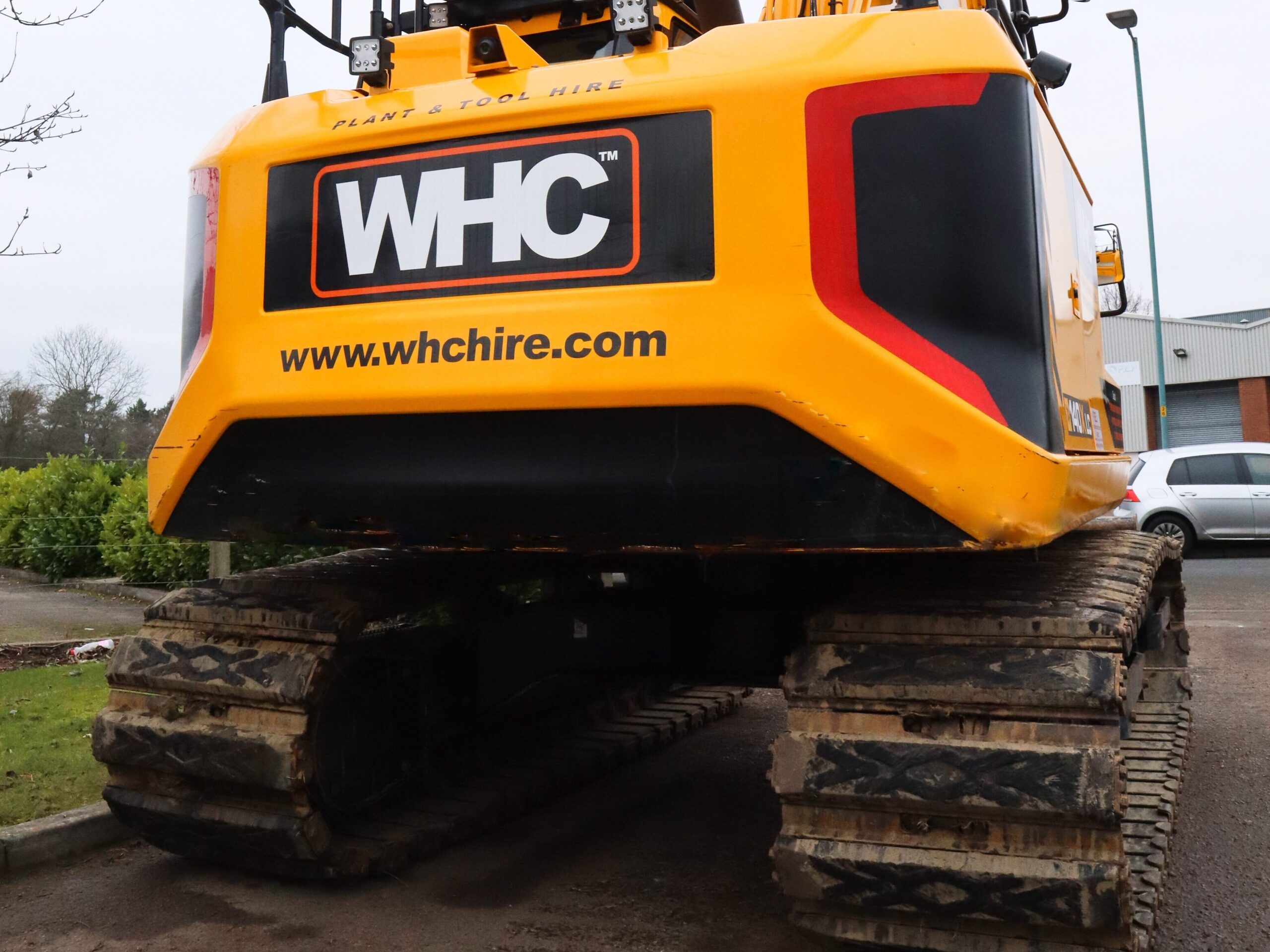
At WHC Hire Services, we have been providing the latest plant and tool hire equipment on the market for over 20 years. Moreover, with several excavator sizes and track options, we can provide the right size excavator for the job. All our excavators from micro to 28T are available with a rubber track option. Allowing you to get the job done and reduce the amount of surface damage you cause along the way.
Find out more about what excavators and options we have to offer here, or call one of our team on 01684377977 today!

